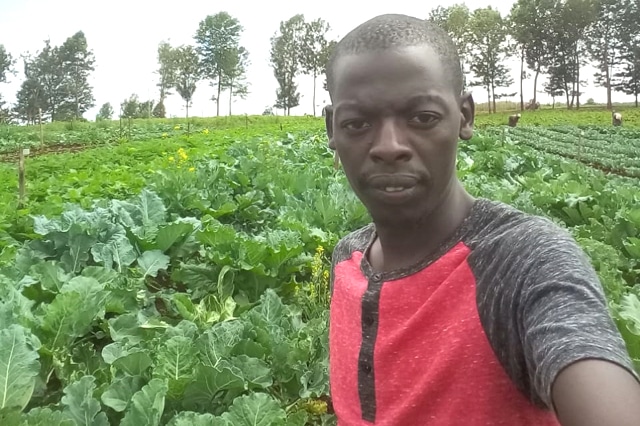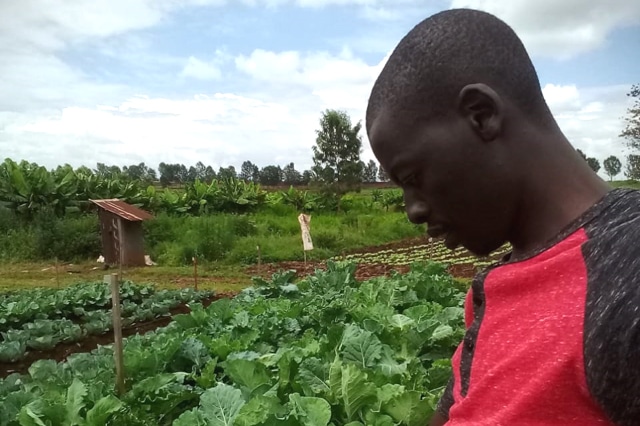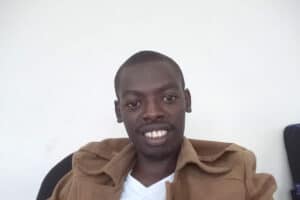Background
A Kenyan national, David studied a diploma in Applied Biology at Thika Technical Training Institute in Kenya and joined Simlaw Seeds Company as a seed analyst in 2016 before moving on to the East African Seed company in 2017 to undertake the same role. He has over 5 years experience in seed production and testing.
David has a driving passion for farming and plans to start a farm back in his village, applying mixed farming techniques and new technologies such as hydroponics. He also plans to train his fellow farmers in the disciplines he has mastered.
Meet David
AGN: What benefit do seed companies provide?
DMN: We provide farmers with seeds that have been engineered through research and development, in order to tilt the odds of good harvests in their favour. Drought and/or disease resistant seeds are some of the types we produce.
AGN: Food security is something many governments deem to be desirable. Is there a drive to reduce the amount of seeds/agricultural produce imported into your country?
DMN: It is desirable to import less for a number of reasons. However, there are some vegetables/crops that we do not have a suitable climate or appropriate facilities to grow. In order to satisfy demand we have to import.
AGN: Might systems such as vertical farming help to expand capacity and reduce reliance on imports?
DMN: There are certain applications and situations that vertical farming is suited to. In terms of the company I currently work for, we supply seeds across the East Africa region. Due to the high volume of seeds we supply and in light of the current costs of vertical farming systems it is not cost effective for us to utilize this technology in our processes.
Once the cost of such systems falls to a point where it is economical to use them, they could possibly be a game changer.

AGN: So you work as a seed analyst, for those unfamiliar with such a role can you shed some light on what you do?
DMN: I mainly work in the quality assurance department in a lab where I conduct various tests to check the quality of our seeds before they are despatched to farmers Seed testing includes, seed sampling, germination testing, purity testing and moisture analysis. I also conduct field work in order to carry out genetic purity testing.
AGN: While we are on the subject of genetics, what is your company’s position on Genetic Modified Organisms (GMOs)?
DMN: GMOs are currently prohibited in Kenya so it is not something our company offers. While GMOs divide opinion, on a personal note I am more in favour of them than against because they produce higher yields. My reservation revolves around the possible detriment to human health. In the absence of comprehensive data derived from studying long term consumption, I don’t believe the question mark over the impact on humans can be answered with any degree of certainty.
AGN: As is the case across Africa, there is a mix of profiles for farmers from large scale commercial to smallholder and subsistence farmers. Where would you say the most challenging area for growth and sustainability lies?
DMN: As far as Kenya is concerned I would say access to capital and levels of taxation in relation to some elements of the agricultural sector constitute two of the main challenges for farmers across the board. Tanzania is a neighbouring country whose government I believe has a more favorable stance on taxation in relation to the sector. I further contend this is why many agricultural products from Tanzania are available in Kenya.

AGN: Every role has its challenges. What are some of the ones you face in your job?
DMN: Most revolve around production. For instance weather conditions can vary in a way that complicates planning. Our company relies on hot weather to dry our seeds. If the weather is being unseasonal and it rains heavily during the harvesting and post harvesting period, our processes and workflow are impacted, which of course can affect deadlines and costs.
AGN: The company you work for has been around for over 40 years, can you share a particular innovation it has developed?
DMN: ‘Maize Hodari’ was developed by the research team at my company. It has been designed to mature within 4 to 5 months and it is a double cobber with a potential yield of 30 to 40 bags per acre. Our company is happy to collaborate with others. As an example, through our work with the Kenya Agricultural & Livestock Research Organization (KARLO) we produced two varieties of beans with a high zinc content.
AGN: Thanks for taking timeout to shine a light into your world.

